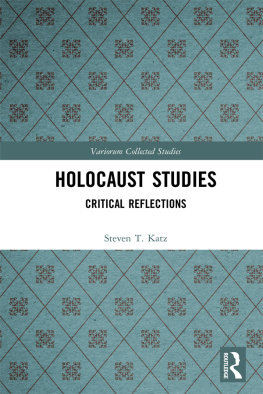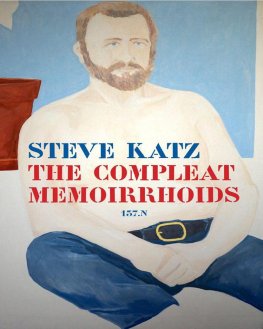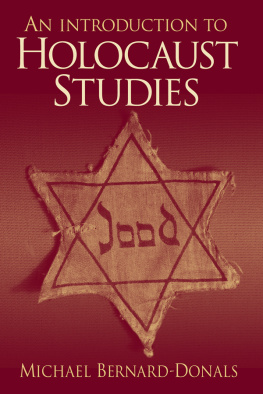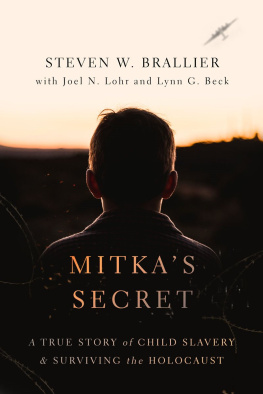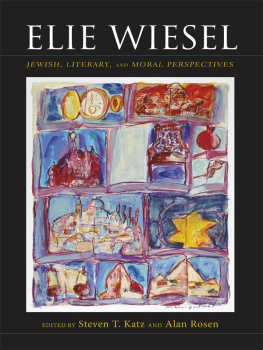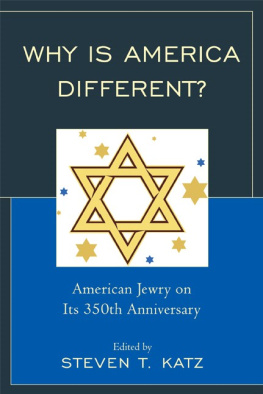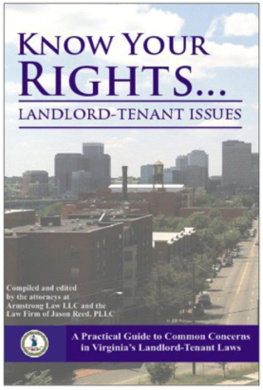Katz Steven T. - Holocaust Studies
Here you can read online Katz Steven T. - Holocaust Studies full text of the book (entire story) in english for free. Download pdf and epub, get meaning, cover and reviews about this ebook. year: 2019, publisher: Taylor & Francis Group, genre: Politics. Description of the work, (preface) as well as reviews are available. Best literature library LitArk.com created for fans of good reading and offers a wide selection of genres:
Romance novel
Science fiction
Adventure
Detective
Science
History
Home and family
Prose
Art
Politics
Computer
Non-fiction
Religion
Business
Children
Humor
Choose a favorite category and find really read worthwhile books. Enjoy immersion in the world of imagination, feel the emotions of the characters or learn something new for yourself, make an fascinating discovery.
- Book:Holocaust Studies
- Author:
- Publisher:Taylor & Francis Group
- Genre:
- Year:2019
- Rating:4 / 5
- Favourites:Add to favourites
- Your mark:
- 80
- 1
- 2
- 3
- 4
- 5
Holocaust Studies: summary, description and annotation
We offer to read an annotation, description, summary or preface (depends on what the author of the book "Holocaust Studies" wrote himself). If you haven't found the necessary information about the book — write in the comments, we will try to find it.
Holocaust Studies — read online for free the complete book (whole text) full work
Below is the text of the book, divided by pages. System saving the place of the last page read, allows you to conveniently read the book "Holocaust Studies" online for free, without having to search again every time where you left off. Put a bookmark, and you can go to the page where you finished reading at any time.
Font size:
Interval:
Bookmark:
Chapter 1 On the Holocaust and comparative history was originally published as the 1993 Leo Baeck Memorial Lecture and is reproduced courtesy of the Leo Baeck Institute, New York.
Chapter 2 Mass death under Communist rule and the limits of otherness was originally published in Robert S. Wistrich (ed.), Demonizing the Other: Antisemitism, Racism and Xenophobia (Amsterdam, 1999), pp. 26692; reprinted by permission of Taylor & Francis, UK.
Chapter 3 Auschwitz and the Gulag : A study in dissimilarity was originally published in Alan Berger (ed.), Bearing Witness to the Holocaust, 19391989: Proceedings of the Holocaust Scholars Conference (Lewiston, ME, 1992), pp. 7189; reproduced by permission of Edwin Mellen Press.
Chapter 4 Children in Auschwitz and the Gulag originally appeared in Rachel Millen (ed.), New Perspectives on the Holocaust (New York University Press, 1996), pp. 1938; reprinted by permission of NYU Press.
Chapter 5 On the definition of Genocide and the issue of uniqueness is taken from the Introduction to Steven T. Katz, The Holocaust and New World Slavery: A Comparison , 2 vols. (Cambridge UK, 2019); reproduced by permission of Cambridge University Press.
Chapter 6 Exploring the Holocaust and comparative history is reprinted from Holocaust Scholarship: Personal Trajectories and Professional Interpretations Festschrift in Honor of Milton Shain , eds. Christopher Browning, Susannah Heschel, and Michael Marrus (London, 2015), pp. 8498; reprinted with permission of Palgrave Macmillan.
Chapter 7 Extermination trumps production: On the issue of Jews as slave laborers originally appeared in Roni Stauber (ed.), Holocaust and Antisemitism: Essays Presented in Honor of Dina Porat (Jerusalem, 2015), pp. 71100; reprinted courtesy of Yad Vashem Publications in association with Tel Aviv University.
Chapter 8 The murder of Jewish children during the Holocaust originally appeared in Continuity and Change: A Festschrift in Honor of Irving Greenbergs 75th Birthday , edited by Steven T. Katz and Steven Bayme (Lanham, MD, 2010), pp. 16788; reprinted by permission of Rowman & Littlefield.
Chapter 9 Thoughts on the intersection of rape and Rassenchande during the Holocaust was originally published in Modern Judaism , 32.3 (October 2012); reproduced by permission of Oxford University Press.
Chapter 10 History and Halakha appears in Yitz Greenberg and Modern Orthodox: The Road Not Taken , eds. Adam Ferziger, Steven Bayme, and Miri Freud-Kandel (Boston, MA, forthcoming 2019); included courtesy of Academic Studies Press.
Chapter 11 Exploring the concept of Kol Yisrael Arevim Zeh LZeh was originally given at a conference entitled Aspects of Jewish Solidarity during the Shoah , held at Yad Vashem in 2014. The conference volume is forthcoming. The paper is included courtesy of Yad Vashem.
Chapter 12 Thinking about Jewish resistance during the Holocaust previously unpublished.
Chapter 13 Elie Wiesel: The man and his legacy originally appeared in Yad Vashem Studies 44.2 (December 2016) pp. 1142; reprinted by permission of Yad Vashem Publications.
Chapter 14 The issue of confirmation and disconfirmation in Jewish thought after the Shoah was originally published in Steven T. Katz (ed.), The Impact of the Holocaust on Jewish Theology (New York, 2005), pp. 1360; reprinted by permission of New York University Press.
Chapter 15 Jewish Theologians respond to the Holocaust was originally published as the Introduction to Part III, European and American Responses during and following the War in Wrestling with God: Jewish Theological Responses during and after the Holocaust , eds. Steven T. Katz, Shlomo Biderman and Gershon Greenberg (New York and Oxford, 2007), pp. 35567; reprinted by permission of Oxford University Press.
On the Holocaust and Comparative History
(Leo Baeck Memorial Lecture, 1993)
The special opportunity offered by the Leo Baeck Memorial Lecture is an appropriate occasion to reflect on the fate, and the meaning of the fate, of European Jewry under the Third Reich. Emerging out of the conflict and confusion of the Weimar years, Hitler came to power first in Germany and then in almost all of western and central Europe, creating in turn the Nuremberg racial laws to dis-emancipate the German Jews, ghettos in which to incarcerate the Polish and Baltic Jews, Einsatzgruppen to murder the Russian Jews, and in the end, death camps to exterminate all the remaining Jews of Europe. East and west, north and south, male and female, young and old, six million out of nine-and-a-half million European Jews were consumed, with active designs existing for the annihilation of the remainder of world Jewry, beginning with the Jews of Britain, the Sephardic communities of North Africa, and the growing community of the yishuv (the Jewish settlement in the Land of Israel).
This is what we know as the Holocaust. The ideologically driven plan to make the world Judenrein . But it is not only as a Jewish phenomenon that this event has entered into the contemporary consciousness. Given its uncompromising project of genocidal elimination coupled with its technological-bureaucratic characters, directed by a capacious racial-Manichean dogmatic, the Shoah has become one of the defining symbols of our age. And as such, given its iconic status, an intense debate has emerged regarding its singularity. This is not least because to the degree that it has become the symbol of evil in our time, it has been co-opted as the standard, the model, by which, through which, and over against which, the writing of other histories of persecution and mass death now take place. In consequence, the historiographical placement of this event cannot be avoided. Or, to put the question very simply and directly: to what degree is the destruction of European Jewry a unique historical event?
As to the percentage of decline a loss of 40 percent of world Jewry and 60 percent of European Jewry these figures are matched or exceeded by, for example: the Native American catastrophe following conquest that claimed up to 96 percent of the total indigenous population within a century; by the Armenian massacres of World War I that were in the range of 40 percent (higher on many projections, though I disagree with these higher figures); and by the decimation of the Australian aborigines following European contact. And other examples could be provided. (3) When making historical comparisons and distinctions of the kind I will offer in my analysis this evening I am not making moral comparisons. Nor again, in defending uniqueness, am I simultaneously endorsing the injudicious claim that the Holocaust is more evil than alternative occurrences of extensive and systematic persecution, organized violence, and mass death. The character of the uniqueness that I am prepared to champion is not tied to a scale or a hierarchy of evil (i.e., of event X being more or less malevolent than another event Y, or all previous events E1 to E11).
I have elsewhere described why it is that the comparison regularly made between the Holocaust and medieval forms of persecution, including medieval antisemitism, are in fact incorrect.instance theological doctrines and practical necessities intervened to constrain the form of the persecutory campaign tool. Those who regularly, if confusedly, see medieval anti-Jewish bigots as Nazis, who misunderstand the attempt to destroy heresy as the equivalent of racial immolation, who mistake the violence against women incarnate in the witch craze for physical genocide, and lastly, those who liken the rhetoric again homosexual acts with the actuality of gas chambers, are both constructing fictions and manipulating the symbol of the Holocaust in ways that are unwarranted by the historical evidence.
Font size:
Interval:
Bookmark:
Similar books «Holocaust Studies»
Look at similar books to Holocaust Studies. We have selected literature similar in name and meaning in the hope of providing readers with more options to find new, interesting, not yet read works.
Discussion, reviews of the book Holocaust Studies and just readers' own opinions. Leave your comments, write what you think about the work, its meaning or the main characters. Specify what exactly you liked and what you didn't like, and why you think so.

